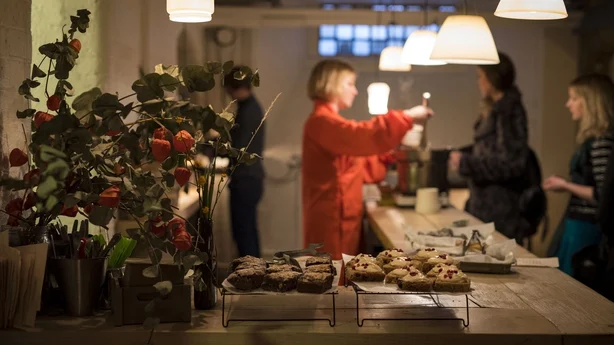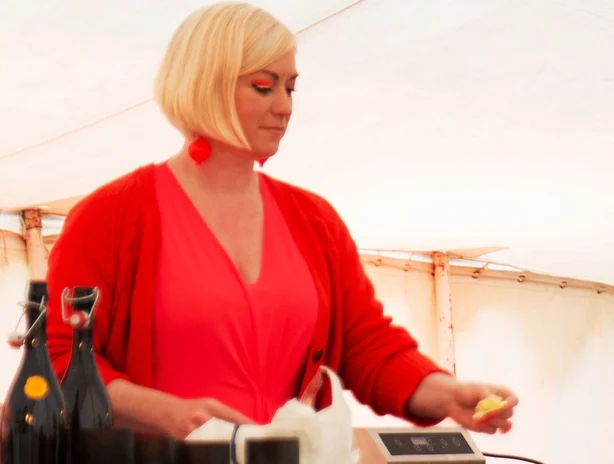How To Soften Corners is a new book from artist Jennie Moran - read an extract below.
It tells the illuminating story of an art project/college canteen called Luncheonette, which Moran operated at the National College of Art and Design in Dublin from 2013-2021, winning Best Café in Ireland at the Food and Wine awards in 2019.
How To Soften Corners serves as a playful how-to guide to hospitality, and its philosophies - the book also contains recipes for some of Luncheonette's best loved offerings.
Create A Site Of Unconditional Hospitality
First things first. Before we delve into the story of Luncheonette in NCAD and how the corners got softened, please indulge me by thinking about hospitality because it was at the centre of everything. It is why and how everything happened.
The law of hospitality is profoundly beautiful and embodies all that is good and decent about us. It is the spirit of human co-existence made visible and recognisable. It is also however impossible, unfeasible, infuriating to abide by, especially for those attempting to eke out a living from it. The word hospitality has been devalued of its original meaning. It is associated now with an industry that is struggling in the aftermath of a mass exodus of those wishing to be part of it. I want us to rehabilitate the word hospitality; to pick it up and dust it off, rummage around in its past, manage its expectations, send it back out into the world, bold and unapologetic.
Hospitality exists as a response to the movement of humans, people leaving their towns and villages in ancient times. The prospect of leaving one's own surroundings to become a stranger elsewhere was an awful one, prompting dread and terror in the heart of the sojourner. To be without shelter for the night could mean death by exposure to the elements or wild animals, or robbery and murder at the hands of highwaymen. Movement is, and was, inevitable.
I brought Luncheonette to NCAD in 2013 with the intention to stay for one or two years. I settled in, allowing layers to develop. It grew steadily. But in depth not width.
So out of necessity an agreement was made by social groups of diverse cultures, all over the world which facilitated the admittance of strangers into a private realm. An infrastructure of shared protection was designed.
This system works on the basis of mutual trust: the wayfaring stranger is invited to food and shelter on condition that they bring no harm. The host in turn vows to keep the stranger safe under their roof and is afforded an opportunity to prove status and honour. There is more than meets the eye to this exchange though.
The mesmerising etymology of the word 'hospitality’ gives us poetic insight into the mutuality of the practice.

all that is good and decent about us'.(Pic: Louis Haugh)
'Ghostis'
‘Ghostis’ is the Indo-European root of the word ‘hospitality’ and it describes neither the host nor the guest but the relationship between the two. The meaning is reversible and bouncy. It flows from one to the other, like an electric current, for as long as both parties are held in their protective bind. It is the space of possibility that opens up between guest and host when they willingly engage in mutual respect. Here, anything is possible.
We can see from this that hospitality is so much more than proprietorial host fussing over compliant visitor. It is the spirit of human co-existence made visible and recognisable and embodies all that is good and decent about us. What I love about ‘Ghostis’ is that it allows for a mutual exchange between guest and host. It invites us to consider the visitor as someone interesting and indispensable; someone who will bring new ideas, show the host new ways of thinking, new ways of seeing themselves. Just as the guest needs the host, so too does the host need the guest to rescue them from their own echo chamber.
In the cold dingy ‘office’ of Luncheonette I had mounted on the wall a crumpled, photocopied extract of philosopher Jacques Derrida’s 1996 seminar, ‘Step of Hospitality/No Hospitality’ which sets out, in no uncertain terms, ‘the law of absolute, unconditional, hyperbolical hospitality’. The passage which I look to begins with the sentence,
‘Let us say yes to who or what turns up, before any determination, before any anticipation, before any identification, whether or not it has to do with a foreigner, an immigrant, an invited guest, or an unexpected visitor, whether or not the new arrival is the citizen of another country, a human animal, or divine creature, a living or dead thing male or female.’
This unassuming piece of paper carries surprising weight. The outlandish and unfeasible demand imprinted on it tells me what the aim is – to welcome each soul that crosses the threshold and cry out to them, ‘Enter quickly for I am afraid of my happiness!’ (Jacques Derrida and Anne Dufourmantelle).
Sometimes I growl at this sheet of paper in frustration.
I fall short and sometimes I fail spectacularly.
"Oh shut up Derrida, have you ever operated a food business?"
I try again. It works sometimes. In my more generous moments, I am able to view these words as a sort of prayer, something to aspire towards and I am thankful because no one else’s words have imparted so clearly the sacredness of the guest/host relationship.
Derrida, thank you. For being a thorn in my side all these years. You give me pain and suffering. I know I will never do right by you. You ask the impossible. You know this. Even still, I am glad you are here with me, my disapproving northern star. I will keep your words close to me and continue in my vain attempt to live by them.

designed to travel to sites where it was most needed,
like a strange ambulance'. (Pic: Philip Brady)
Six Hundred Thousand Volts of Joy
A 'luncheonette' is a light-on-its-feet food station. It is flexible and adaptable and can even move from place to place to serve its purpose in different contexts, for different reasons.
I brought Luncheonette to NCAD in 2013 with the intention to stay for one or two years. I settled in, allowing layers to develop. It grew steadily. But in depth not width. I resisted invitations to expand Luncheonette into other sites. I can account for this reticence in a few ways. Firstly, I did not want more than one Luncheonette. Yuck! I was very present in the day-to-day running of the place and couldn’t imagine it otherwise. Mostly, I was having too much fun in NCAD, learning so much from being there every day, meeting visitors, washing dishes, planning menus, learning from chefs; all the while watching carefully for signs of impact on the college.
In 2019 we were awarded Best Café in Ireland at the Food and Wine awards. Imagine! We were astonished even to have been nominated - that a college canteen could be given this sort of recognition from food critics was indeed heartening. When they called Luncheonette out at the ceremony, I sat there for a long time frowning, immobilised with the shock of it. Eventually someone elbowed me out of my daze and told me to "get up for feck sake and take the prize". This was a gorgeous moment for all our team, past and present. We floated around in the aftermath, bolstered up by this accolade and determined to do right by it.
We closed when Covid landed and then tried various incarnations, all of which created distance between us and the students. We were no longer able to bring people into the kitchen and I really missed this aspect. When it came to reopening properly, there were a lot of new mysteries to solve, and exciting design challenges. I Leave a Trace 97 was gathering myself to go into fix-it mode, notebook out, inventing and reimagining. I recall most vividly sitting in my garden and experiencing the shocking realisation that, this time, it would not be me doing the solving. I could see with absolute clarity that the time had come to hand the reins on to someone else.
Leaving is a very important part of the hospitality exchange. If the guest doesn't leave, the whole system implodes.
I had created Luncheonette as a mobile hospitality service, designed to travel to sites where it was most needed, like a strange ambulance. NCAD had held me, mesmerised, for eight years and now it was just simply time to go on to the next challenge. This revelation was both exhilarating and awful. I had put my heart and soul into this place. I loved the bones of it and the people in it. If it hadn’t been for the rude interruption of Covid, I might have forgotten to ever leave. There ensued an obscenely messy outpouring of emotion (mine) in the boardroom over a conversation with college management about leaving. The news was received with kindness and support and we made a plan to work together on a nice transition and set to work finding a new canteen operator. I understand now that the decision to leave, though profoundly sad, was manageable because it was clear that the college was no longer in a hospitality crisis and it was ok to take Luncheonette away.
Over a midweek supper, Siobhán the head chef, and I discussed the possibility of her forming a new business of her own and making an application to NCAD for the catering tender. Happily, Siobhán’s proposal selected by the college, and she now runs her café, called The Goodies as the canteen, along with some members of the previous Luncheonette team. I am delighted about this continuity in the food and approach, and commend the NCAD community for continuing to support a small independent business.
Leaving is a very important part of the hospitality exchange. If the guest doesn’t leave, the whole system implodes. NCAD was a gracious host to Luncheonette and supported me generously from day one. It is a place and community that has a firm hold of my heart. Over the course of the eight years we fed roughly 600,000 souls. I am amazed how many of those faces pop into my head, and how often, visiting me still in my memory. It’s a lovely feeling.
We need your consent to load this Instagram contentWe use Instagram to manage extra content that can set cookies on your device and collect data about your activity. Please review their details and accept them to load the content.Manage Preferences
How To Soften Corners is published by Dropout Press, and available via The Library Project here - find out more about artist Jennie Moran here.
Disclaimer: The copyright of this article belongs to the original author. Reposting this article is solely for the purpose of information dissemination and does not constitute any investment advice. If there is any infringement, please contact us immediately. We will make corrections or deletions as necessary. Thank you.






